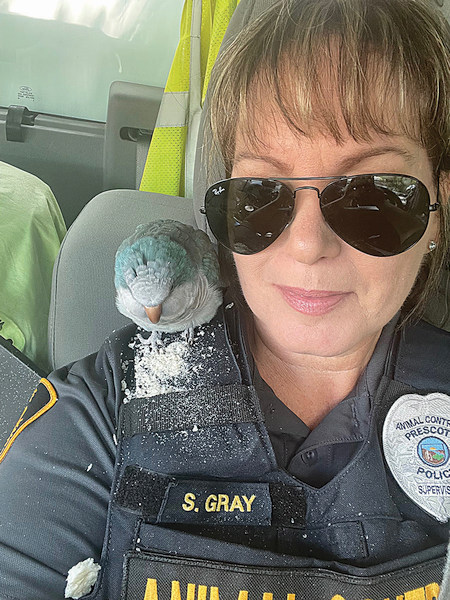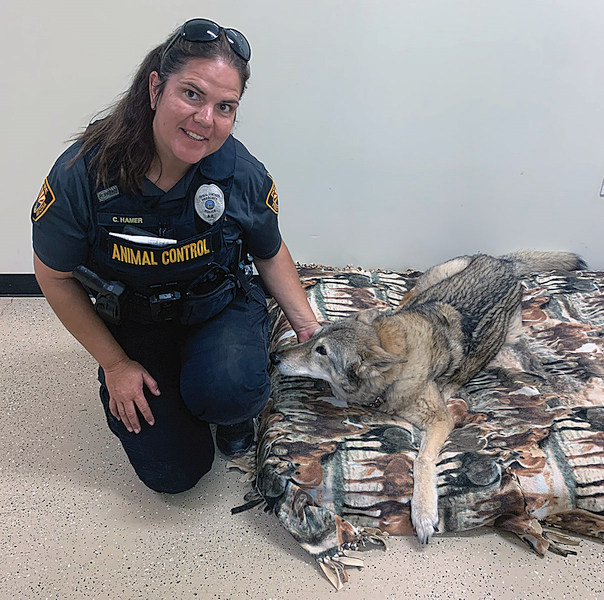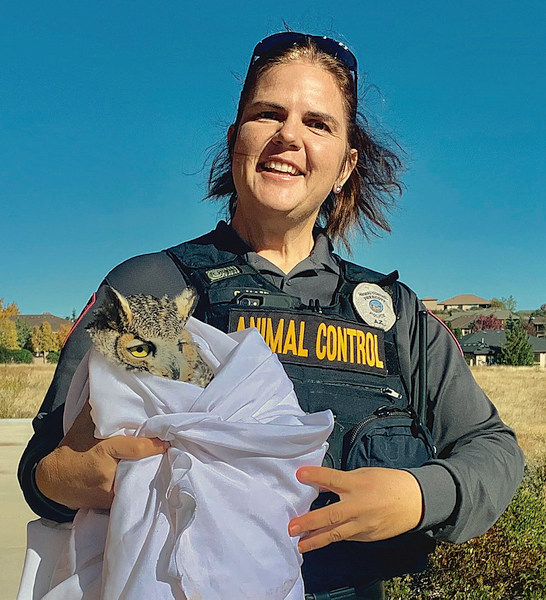By Shari King
For anyone who loves animals, seeing any of them abused or abandoned is just heart breaking. Imagine if it was your job to daily investigate reports of neglect or the mistreatment of animals. Obviously, not a good career choice for the empathetic animal lover, but rather for a fearless advocate for the innocent voices of our furry friends.

Animal Control Officer Shannon Gray has been advocating for animals professionally for over 16 years. Gray is a supervisor and explained that in Northern Arizona, Animal Control works for law enforcement agencies.
For example, Prescott Animal Control Officers work for the Prescott Police Department. The Yavapai County Sheriffs have their own ACO’s for the County. Prescott Valley has their own ACO’s, and Chino has their own as well.
Gray said, “We all work well with each other, and we hold meetings between agencies every three months or so. That way we can discuss issues, ask for assistance, and compare experiences.”
She has been working with animals since she was a teen. “I started working in pet stores as soon as I was old enough to work, and then in an animal hospital as a kennel tech. I also tried grooming, but found I wasn’t very good at it! I had always wanted to be an Animal Control Officer (ACO). I love working with people, helping animals, and working in law enforcement.”
Animal control officers work a normal work week and are not on call 24/7. If they are not on duty, a police officer will respond to priority calls such as a dog loose in the roadway, an animal bite, or cruelty cases. But, ACOs do get called out after hours from time to time, especially for high-priority situations.
To be an ACO, the requirements are a High School diploma and a clean driving record. Applicants must pass an extensive background check and be physically able to do the job. Previous animal or law enforcement experience is a definite plus.
Camp Verde Animal Control Officer Earl Huff has all that, plus he served 17 years as a police officer with the Camp Verde Marshals Office before becoming a Camp Verde ACO.
When he retired from police work in 2012, he returned as a dispatcher but wasn’t satisfied with the desk job, so he made a change. “I was just tired of sitting inside 10 hours a day, so I transferred to Animal Control,” said Huff.
Officer Gray also said that outside animal experience is another definite plus, and Animal Control Officer Cara Hamer has that plus times two.

Hamer has been an animal control officer for 5 years. She served three years in San Diego County and has two years under her belt for the City Of Prescott.
She grew up in South Africa where her family was very involved in wildlife conservation, and it instilled in her a deep passion for animals and wildlife.
“I am a person with strong ethics and have always felt a need to help protect those with no voice,” she shared. “This is not a job for the faint of heart, as we are the first responders when it comes to the welfare of our animals in our community. I have felt that this job was my calling, and I am fortunate to have landed here.”

As a child, Hamer lived in a game reserve. “We had many wonderful and unique animals that passed through, from a meerkat, crowned crane, and even an orphaned lion cub once. My childhood companions were dogs, cats, horses, sheep, a donkey, lots of reptiles and fish.”
She not only had experience with African animals, but also in rehabilitation and game capture methods.
She was the assistant training director of the AZTEC Schutzhund Club, a form of protection dog training. She elevated her experience with working dogs through training, seminars, and competing with her own dogs in high level competition.
She was also a guide at the San Diego Zoo and Safari Park for 6 years, and said, “All this has been helpful in my job and has built a large diversity in my knowledge of animals. I take any opportunity to share my passion for animals and wildlife.”
Although wildlife issues are handled by Arizona Game and Fish, ACO’s do work with the Arizona Game and Fish from time to time. Officer Gray said “If there are bear or mountain lion sightings, we will work together to make sure the animals are not causing a threat to the public. Most recently, we worked with Game and Fish regarding a coyote who was actively biting people in a neighborhood. Luckily the coyote was not positive for rabies. We also work with the Heritage Park Zoological Sanctuary. We have brought in baby javelina, baby deer, and various birds for rehab.”
Hamer added, “We are often asked to assist if they have no wildlife officials in the immediate area. I personally love these calls and have been lucky enough to see lots of our native animals up close.”
All three officers agree that the most frequent calls Animal Control gets is barking complaints.
Officer Huff said, “Camp Verde does not have a barking-dog ordinance per se, so it is a nuisance noise ordinance.
“It is a complicated thing to enforce. Citizens are asked to call when the barking is occurring, not hours or days later. They can also record the barking but are still encouraged to call when it is occurring. The person calling would have to testify in court if the dog owner was cited. By calling when the barking is occurring and we are able to hear the barking, then the caller is not needed to testify.”
Huff explained that the same situation applies to loose dogs.
“We get a lot of calls about their neighbor’s dogs getting out and causing problems. A lot of these calls come hours after it has occurred or even the next day. The neighbors get fed up and ask us to cite them. Unfortunately, we have to see the animal out, or the person calling has to testify in court.
“Citations cannot be issued without probable cause and then proven beyond a reasonable doubt in court. The only way to satisfy these burdens is to have evidence or eye witness testimony. Many callers wish to be anonymous which unfortunately ties our hands on taking enforcement action.”
Gray gave this advice for the common complaint of dogs barking.
“We do have a barking dog hotline in Prescott at 928-777-1364. But the best advice I have for our community regarding barking is to speak to your neighbor, and be kind. Many times people have no idea they have a dog that barks when they are away from home. Bring a friendly face and open a line of communication and get to know your neighbors; it is a good thing.
“We are losing this in our technical, modern world, and many times your communication will be well received.”
Hamer agrees and shared, “Please try to understand that dogs do bark at people walking by, other animals, and construction workers to name a few examples. This type of barking is not going to be a violation.
“If we feel the barking is not provoked, we will then attempt contact with the dog owner. Sometimes the owner has no idea that Fluffy is at home barking all day while they are at work.”
Animal Control officers work closely with Yavapai Humane Society, as they are the host facility for all the stray animals who end up in ACO hands.
“I have taken the Yavapai Humane Society everything from farm pigs to kittens and many dogs who have lost their way,” said Gray. “As for the exotic pets, they often end up hanging out in our office until an owner is located.
“Yavapai Humane Society recently sent staff and vehicles including a horse trailer to help with a hoarding case where 156 dogs were rescued and found a soft landing. It takes a village for sure.“
Hamer said this hoarding case turned out to be one of her most heartwarming events.

“My gut was telling me there was more to the well-hidden nightmare. It started with a barking complaint and grew into the unthinkable. Our persistence paid off with a total of 156 dogs and one pot belly pig being removed from horrible conditions.
“Those dogs now have homes and families who love them. Some are walking outside in the grass for the first time at 15 years old, in the fresh air and sunshine with people who love them.
“Huge thanks to Prescott Valley Animal control, Chino Valley Animal control, Yavapai County Animal control, and Yavapai Humane Society for listening to my last minute plea for assistance.”
Hamer finished by saying, “I love it when people stop me and share their rescue stories. I get to revisit with some furry friends who had no voice and desperately needed help, and with persistence and the help of a village. they are now free from a horrible situation.”
Gray echoed that sentiment and said, “Anytime I can take an animal out of a bad situation and make its life better is always a good feeling.”

